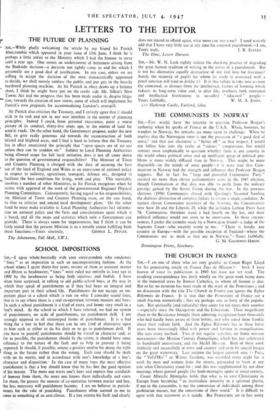SCHOOL IMPOSITIONS
Sta,—I agree whole-heartedly with your correspondent who condemns " lines " as an imposition in such an uncompromising fashion. At the school where I spent thirty-five years, twenty of them as assistant master and fifteen as headmaster, "lines" were ruled out entirely as long ago as 1900 by the headmaster as being both injurious and foolish. I have often been surprised, in talking to old public-school boys, at the way in
S which they speak of punishments as if they had been an integral and important part in their school life. Punishments do nor occupy an im- portant place in a school which is run on what I consider sound lines, that is to say where there is a real co-operation between masters and boys. In such a school punishment is a kind of extra, and looms very small in a boy's mind. At the school to which I have referred, we had no system of punishments, no scale of punishments, no punishment drill. I am strongly opposed to all stereotyped forms of punishment. It is a bad thing for a boy to feel that there can be any kind of alternative open to him such as either to do his duty or to go to punishment drill. If you have to punish; punishments should be varied in character and, as far as possible, the punishment should fit the crime; it should have some reference to the nature of the fault and so help to prevent it being repeated. It should, if possible, arouse a positive motive for doing the right thing in the future rather than the wrong. Each case should be dealt with on its merits, and in accordance with one's knowledge of a boy's character and disposition' In the case of many boys the most effective punishment is that a boy should know that he has lost the good opinion . of his master. The more one trusts one's boys and expects fine standards of honour from them, the more one knows them individually and cares for them, the greater the amount of co-operation between master and boy, the less necessary will punishment become. I am no believer in punish- ments for the sake of punishing. Punishment often seemed to me to come as something of an anti-climax. If a boy regrets his fault and clearly
does not intend to offend again, what more can one want? I need scarcely add that I have very little use at any time for corporal punishment.—I am,






































 Previous page
Previous page